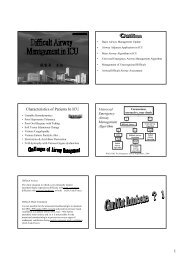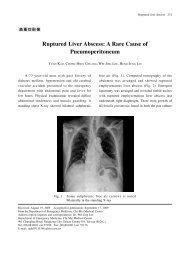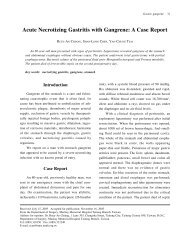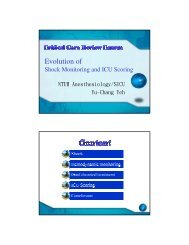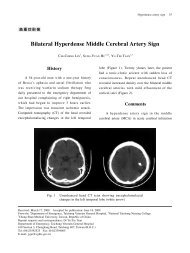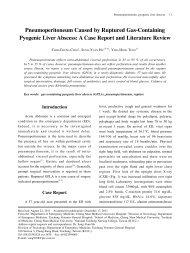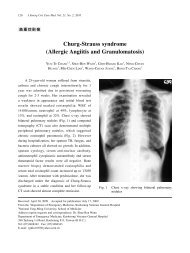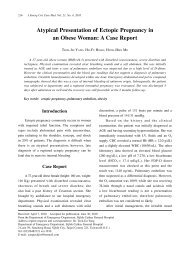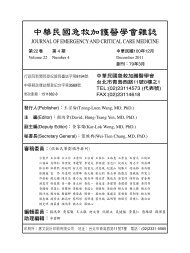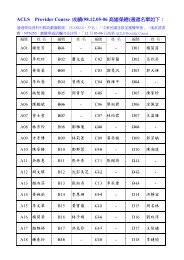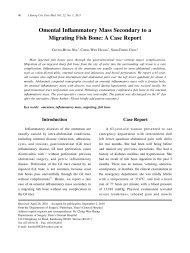2010 American Heart Association
2010 American Heart Association
2010 American Heart Association
Create successful ePaper yourself
Turn your PDF publications into a flip-book with our unique Google optimized e-Paper software.
Part 3: Ethics<br />
<strong>2010</strong> <strong>American</strong> <strong>Heart</strong> <strong>Association</strong> Guidelines for Cardiopulmonary<br />
Resuscitation and Emergency Cardiovascular Care<br />
Laurie J. Morrison, Chair; Gerald Kierzek; Douglas S. Diekema; Michael R. Sayre;<br />
Scott M. Silvers; Ahamed H. Idris; Mary E. Mancini<br />
The goals of resuscitation are to preserve life, restore health,<br />
relieve suffering, limit disability, and respect the individual’s<br />
decisions, rights, and privacy. Decisions about cardiopulmonary<br />
resuscitation (CPR) efforts are often made in seconds by<br />
rescuers who may not know the victim of cardiac arrest or<br />
whether an advance directive exists. As a result, administration<br />
of CPR may be contrary to the individual’s desires or best<br />
interests. 1–3 However, practice is evolving as more emergency<br />
physicians reportedly honor legal advance directives in decisions<br />
about resuscitation. 4–7 This section provides guidelines for<br />
healthcare providers who are faced with the difficult decision to<br />
provide or withhold emergency cardiovascular care.<br />
Ethical Principles<br />
Healthcare professionals should consider ethical, legal, and<br />
cultural factors 8,9 when caring for those in need of CPR.<br />
Although healthcare providers must play a role in resuscitation<br />
decision making, they should be guided by science, the individual<br />
patient or surrogate preferences, local policy, and legal<br />
requirements.<br />
Principle of Respect for Autonomy 10<br />
The principle of respect for autonomy is an important social<br />
value in medical ethics and law. The principle is based on<br />
society’s respect for a competent individual’s ability to make<br />
decisions about his or her own healthcare. Adults are presumed<br />
to have decision-making capability unless they are incapacitated<br />
or declared incompetent by a court of law. Truly<br />
informed decisions require that individuals receive and understand<br />
accurate information about their condition and prognosis,<br />
as well as the nature, risks, benefits, and alternatives of any<br />
proposed interventions. The individual must deliberate and<br />
choose among alternatives by linking the decision to his or her<br />
framework of values. Truly informed decisions require a strong<br />
healthcare provider–patient relationship/communication and a<br />
3-step process: (1) the patient receives and understands accurate<br />
information about his or her condition, prognosis, the nature of<br />
any proposed interventions, alternatives, and risks and benefits;<br />
(2) the patient is asked to paraphrase the information to give the<br />
provider the opportunity to assess his or her understanding and<br />
to correct any misimpressions; and (3) the patient deliberates and<br />
chooses among alternatives and justifies his or her decision. 11<br />
When decision-making capacity is temporarily impaired by<br />
factors such as active illness, treatment of these conditions may<br />
restore capacity. When the individual’s preferences are unknown<br />
or uncertain, emergency conditions should be treated until<br />
further information is available.<br />
Advance Directives, Living Wills, and<br />
Patient Self-Determination<br />
A recent study documented that more than a quarter of elderly<br />
patients require surrogate decision making at the end of life.<br />
Advance directives, living wills, and executing a durable power<br />
of attorney for health care ensure that when the patient is unable<br />
to make decisions, the preferences that the individual established<br />
in advance can guide care. These decisions are associated with<br />
less aggressive medical care near death, earlier hospice referrals<br />
for palliation, better quality of life, and caregiver’s bereavement<br />
adjustment. 12<br />
A healthcare advance directive is a legal binding document<br />
that in the United States (US) is based on the Patient Self-<br />
Determination Act of 1990. 13 It communicates the thoughts,<br />
wishes, or preferences for healthcare decisions that might need<br />
to be made during periods of incapacity. The Patient Self-<br />
Determination Act mandated that healthcare institutions should<br />
facilitate the completion of advance directives if patients desire<br />
them. 13 Advance directives can be verbal or written and may be<br />
based on conversations, written directives, living wills, or<br />
durable power of attorney for health care. The legal validity of<br />
various forms of advance directives varies from jurisdiction to<br />
jurisdiction. Courts consider written advance directives to be<br />
more trustworthy than recollections of conversations.<br />
A living will may be referred to as a “medical directive” or<br />
“declaration” or “directive to physicians,” and it provides written<br />
direction to healthcare providers about the care that the individual<br />
approves should he or she become terminally ill and be unable to<br />
make decisions. A living will constitutes evidence of the individual’s<br />
wishes, and in most areas it can be legally enforced.<br />
A durable power of attorney for health care is a legal<br />
document that appoints an authorized person to make healthcare<br />
decisions (not limited to end-of-life decisions). Simply put, a<br />
The <strong>American</strong> <strong>Heart</strong> <strong>Association</strong> requests that this document be cited as follows: Morrison LJ, Kierzek G, Diekema DS, Sayre MR, Silvers SM, Idris<br />
AH, Mancini ME. Part 3: ethics: <strong>2010</strong> <strong>American</strong> <strong>Heart</strong> <strong>Association</strong> Guidelines for Cardiopulmonary Resuscitation and Emergency Cardiovascular Care.<br />
Circulation. <strong>2010</strong>;122(suppl 3):S665–S675.<br />
(Circulation. <strong>2010</strong>;122[suppl 3]:S665–S675.)<br />
© <strong>2010</strong> <strong>American</strong> <strong>Heart</strong> <strong>Association</strong>, Inc.<br />
Circulation is available at http://circ.ahajournals.org DOI: 10.1161/CIRCULATIONAHA.110.970905<br />
Downloaded from<br />
circ.ahajournals.org at NATIONAL S665 TAIWAN UNIV on October 18, <strong>2010</strong>



